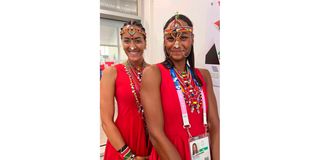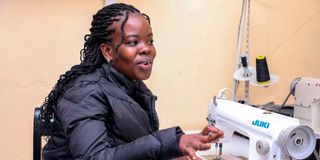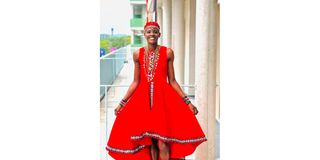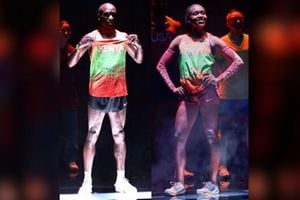
Kenyan Fencer Alexandra Ndolo(left) and Swimmer Maria Mcbrunlehner ready for Paris Olympics opening ceremony.
Stepping into Joy Wanja’s single room in Nairobi’s Ngara marks the beginning of an inspiring journey from modest beginnings to significant achievements.
Despite its small size, this space has become the creative hub for a brand that dressed the Kenyan Olympic team for the opening ceremony.
With its distinctive blue wooden door, the shop is filled with an air of creativity and resourcefulness, reflecting Joy's commitment to sustainable fashion.
At the entrance, a laundry basket brimming with fabric scraps stands as a testament to Joy’s passion for sustainability. The 30-year-old repurposes these remnants into aprons and other innovative items, showcasing her ability to transform waste into functional products.
A small desk, neatly arranged with tea leaves, a kettle, and a container of sugar, stands ready to offer guests a warm welcome.
The gentle hum of three electric sewing machines fills the room, a sound that underscores her dedication and skill. In the corner, a basket overflows with Ankara fabric scraps, each piece treasured for its potential.
A bulky leather tote bag, likely Joy’s own, hangs from a large wooden chair, while a clothes hanger displays her ready-to-wear collection.
Joy, the CEO of Kovu Couture, proudly identifies herself as a fashion designer by both passion and profession. She describes herself as a girl with big dreams, an entrepreneur, and a fun-loving individual.
“I've been doing this since 2018,” she says, “I studied fashion as an undergraduate at Kenyatta University. I do everything myself.”

The Owner of Kovu Couture Joy Wanja during the interview at her workplace in Ngara, Nairobi on Monday, July 29, 2024.
Last year marked a significant milestone for Joy, as she secured her current workspace with the help of her mother. This year, she took another step forward by hiring an intern to manage the increased workload that came with the move.
“For all that time, I was working from home and visiting clients to take their measurements for orders. That’s why I always carry a big tote bag with me—it holds all my essentials,” she says.
Her focus was solely on stitching bridal wear or kimonos, dresses or jackets for individuals.
The Olympic Deal
The turning point in Joy's career came when the Ministry of Youth and Sports Affairs announced a call for designers to create outfits for the Kenyan Olympic team. Joy saw this as a golden opportunity to showcase her talent on a global stage.
“I knew I had to seize the opportunity,” she recalls.
She researched previous Olympic outfits, drawing inspiration from their colours and designs, and submitted a few sketches, waiting anxiously for the outcome.
“There were three categories to submit to,” she says. “I started with random ideas of dresses, shorts, palazzo pants, and kimonos. I had to think about what would suit a large number of people, what would work in Paris, and how to showcase Kenya.”
In May, she received the life-changing call that she had won the contract to design the opening ceremony attire.
“I could not believe it at first,” she admits.
Joy acknowledges that when she won the contract, it hit her that she could not handle mass production alone, but the ministry reassured her that other designers would assist with the work.
The Outfits
July was an incredibly hectic month for Joy as she worked tirelessly on the outfits.
“When it came to the sewing, everything was being done in different places. There were 80 outfits in total, and sleep was out of the question,” she says.

Captain Triza Atuka ready for Paris Olympics opening ceremony.
“We worked with 10 tailors, and often, they had to work overtime. On the last day of delivery, we didn't sleep; we had to sew the buttons by hand, which took much longer than expected.”
Social media backlash
But just like many designers, not all designs appeal to everyone. Her first reveal sparked a social media uproar after the samples were presented at the State House.
“We did three samples at first, but we didn't want to do embroidery initially because it's expensive, however, after receiving feedback, we had to go back to the drawing board,” she says.
‘‘What was presented at State House was the sample, not the final outfits. However, I only did [designed] the men’s shirt and the pants. The men's sample was a two-piece senator suit and a Maasai shuka, though it was not supposed to be an actual shuka, it was meant to be a Maasai print on a lighter fabric like silk although because of the timelines and approvals, we were only able to source the actual shuka as a sample. We were not able to do the beadwork for the samples because it required more time and the timeline was tight,’’ she says.
She says from the feedback received, the main issue was on the fabric.
"It [fabric] was not of quality, the Ministry had no problem with the embroidery. The fabric was the only thing we changed because when you look at the final design, the only difference is that we added another embroidery to the side. We did not make too many changes although we got rid of the Maasai shuka,’’ Joy tells Lifestyle, adding, "But I felt like they didn't get the idea I was trying to pass across. I wanted to blend culture with style, but the execution wasn't right with the first samples."
Despite the setbacks, Joy persevered.
“I did feel like giving up at some point; it was disheartening. I knew I was selected because my design was good, but as an artiste, you have to take criticism—it helps you improve,” says Joy, who designed the opening ceremony attire, while other design houses such as Home_254 founded by one Job Brian, came up with the travelling kit.
Modern Design
For the men's outfits, Joy chose trousers and shirts, while for the women, they settled on a dress, knowing it would be flattering for everyone.
“I wanted it to be distinctly Kenyan, so I chose the Maasai culture. I know people think the Maasai shuka is overdone, but it is instantly recognisable as Kenyan. Even though it’s been overdone, it reflects us,” she explains.

African champion Ferdinand Omanyala ready for the Paris Olympics opening ceremony.
The weather in Paris also influenced fabric selection.
“We thought it would be hot, but it rained instead. The ministry wanted something different for the athletes, not just sports apparel," Joy notes.
For the men's outfit, she designed a fedora with Kenyan beadwork, a short-sleeved Chinese collar shirt, and dress pants. The women's outfit featured a high-low circular dress made from stretch fabric, accessorised with cuffs, headpieces, and cascading necklaces adorned with Maasai beadwork.
To modernise the final design, Joy incorporated embroidery, a versatile and modern method of fabric decoration. “Embroidery is easy to manipulate and can be done in many ways, either on a machine or by hand,” she says.
She took inspiration from the Maasai shield for the patterns, adding a contemporary twist to traditional motifs.
Harsh Criticism
Navigating the public scrutiny challenges was another hurdle for Joy, especially after the sample design sparked controversy.
“The presence of my support system meant everything to me,” she confesses, “I had to take a break from social media. Twitter [X] users can be merciless. There was a photo of me and my mom with the cheque, and people questioned why I was smiling. It was a good moment for me, but their comments made me question everything. I didn't do anything wrong; I just participated in a competition. I got caught up in the crossfire because everyone was upset about the outcome of the outfits.”
Despite the negative comments, Joy's hard work and perseverance paid off. The final outfit appealed to many globally.
“I won in two categories: first place for the opening ceremony, which came with Sh300,000, and third place for the casual kit, which was Sh100,000," she says.
For her business, the recognition brought about significant benefits.
“I've been getting more followers on social media, more inquiries about my business, and orders are starting to come in. It has given me more credibility as a designer, even though it came with a lot of negativity.”
Looking ahead, Joy emphasises the importance of investing in the arts.
“Art brings culture. We need to identify what is truly Kenyan in terms of fashion, music, and accessories. Kenya is known for its fashion, but we lack a specific identity,” she says.
“When we look at our designers presenting globally, they are all just doing African culture like Kitenge, but there is nothing specifically tied to Kenya.”
Her advice to aspiring designers is clear: “Keep doing it and don't give up. Discipline is also very important. Keep putting yourself out there to be seen."
[email protected]











